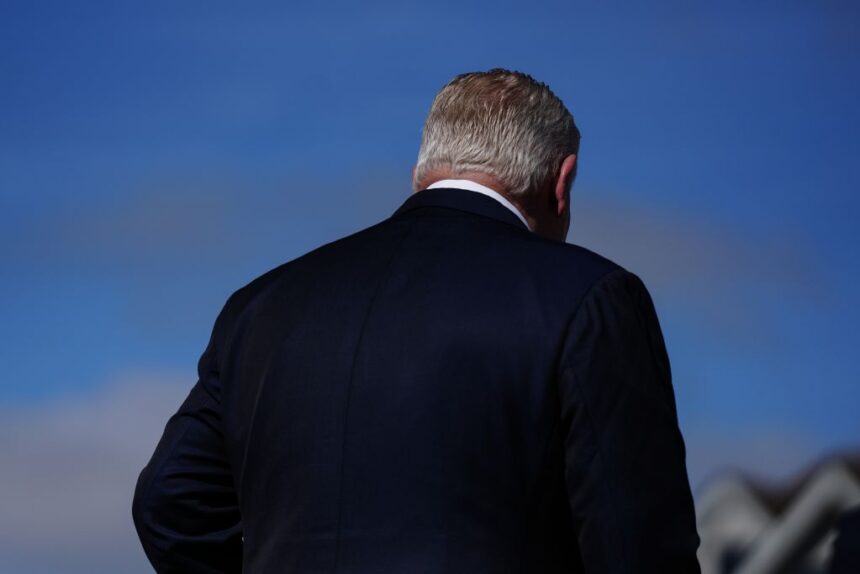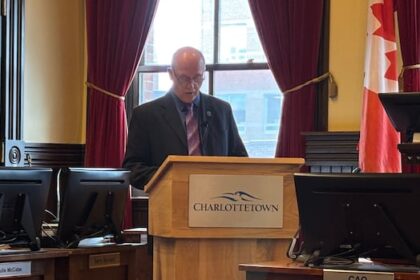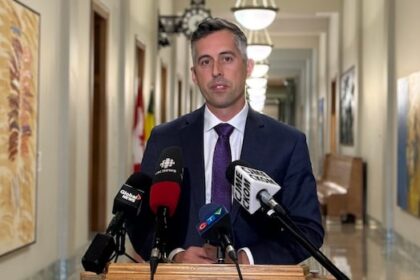The Doug Ford government is moving to eliminate Ontario’s legal requirements for a provincial climate plan and emissions-reduction targets. Buried in the omnibus bill for the government’s annual fall economic statement is a proposal to repeal parts of the 2018 Cap and Trade Cancellation Act, which has required the government to prepare a climate plan and report progress on it to the public. The act was introduced by the Ford government upon taking office to eliminate the provincial carbon price, erroneously called a “carbon tax” by Conservative officials. The law served as the foundation of its legal challenge of federal carbon pricing at the Supreme Court, in which Ontario argued it would create a climate plan that “will tackle climate change in a balanced and responsible way, without placing additional burden on Ontario families and businesses.” The move to repeal parts of this act comes as Ontario deals with increasingly extreme weather that scientists say is being fuelled by unaddressed climate change, driven by the burning of fossil fuels. Earlier this week, the province released its accounting of the wildfire season, which scientists say is getting longer and more intense due to climate change. The 2025 season saw nearly 600,000 hectares burned — more than twice the size of Ottawa— and saw thousands of Ontarians displaced. Last year’s intense heat waves in eastern Ontario were made more likely because of human influence on the climate, according to federal scientists. And in 2023, Ontario saw a spike in asthma cases after intense wildfires created toxic smoke that blanketed cities. At the time, Ford’s own government released a report indicating climate change posed major health and economic risks to Ontarians. The Doug Ford government is moving to eliminate the legal requirement for a climate plan and greenhouse gas emissions, which it introduced in 2018 to reduce Ontario’s contributions to the climate crisis. Photo: Carlos Osorio / The Narwhal Despite proposing a legal requirement for climate planning, the Ford government has long ignored it, issuing only one plan since the law passed seven years ago. That was released in 2019 as a draft proposal, with the latest update published in 2022 repeating the same information, the auditor general found in a report released last month. Minister of Finance Peter Bethlenfalvy told reporters Thursday that Ontario was leading the country in greenhouse gas reductions, though much of these reductions happened between 2005 and 2014 when Ontario moved away from coal power. Bethlenfalvy said the impetus for this move was the federal government’s decision to drop emissions targets, though that hasn’t happened yet. “So earlier this week, the federal government dropped their targets and as Prime Minister [Mark] Carney has said, it’s not about targets, it’s about results,” Bethlenfalvy said at a press conference on the omnibus bill. The federal government has not made any explicit statement about abandoning its current target, set in 2021, which is to slash emissions to at least 40 per cent below 2005 levels by 2030. In September, however, Prime Minister Mark Carney did not answer directly when asked about targets, but said “the government is focused on results.” That month the Canadian Climate Institute said Canada’s 2030 goal had become out of reach, as recent government policies like removing the consumer carbon tax, delaying electric vehicle sales targets and promoting the expansion of the natural gas industry were preventing/obstructing the country from reaching its emissions reduction goals. Nevertheless, Canada has committed to a more stringent climate target for 2035. On Tuesday, the federal government tabled its budget with a “climate competitiveness strategy,” which did not contain any specific commitments on emissions reduction targets. The day after, pressed again about the 2030 target, Carney said “we are not abandoning it,” according to a report by The Canadian Press. In subsequent comments, Bethlenfalvy clarified that he was referring to Carney’s “results” comment and added that Ontario needs “a complete strategy,” but didn’t specify what that would look like. He said he supported “nation building,” which for him included both nuclear energy and also “conventional oil and gas” like liquefied natural gas, which is made up primarily of methane, a potent greenhouse gas. The Carney government has recently used the term “conventional energy” to refer to the oil and gas industry. “We’re not going to relent, but we’re going to focus on outcomes and not targets,” Bethlenfalvy said. “We’re going to make sure we continue down a path to reduce greenhouse gas emissions and that commitment hasn’t wavered.” But the government’s past actions have already brought this commitment into question. “The government is admitting they just don’t care about climate and they have no damn plan,” Ontario Greens Leader Mike Schreiner told The Narwhal. “We knew all along they didn’t have a plan, and emissions are going up. The government is telling us what we already knew … they clearly don’t care about the climate crisis.” Neither the Ontario Ministry of Environment nor the Prime Minister’s Office responded to questions from The Narwhal by publication time. In response to the Ford government’s move to drop the requirement for climate planning, Ontario Greens Leader Mike Schreiner said “The government is telling us what we already knew … they clearly don’t care about the climate crisis.” Photo: Sid Naidu / The Narwhal The auditor general’s October report offered a scathing analysis of the government’s climate progress, finding Ontario would miss its own targets by “an even wider margin” than expected. The auditor general’s report said the government had likely overestimated its greenhouse gas emissions reductions in many sectors, including transportation and waste, and had no targets beyond 2030. The auditor general recommended the government set stronger targets, prepare and consult the public on an updated climate change plan and regularly review and update it. The Ministry of Environment rejected these recommendations, stating: “Ontario will maintain an adaptable and agile approach that is responsive to the opportunities, needs and circumstances of Ontario’s economy and job creators, rather than strictly adhere to a path or actions that do not account for current, future and unknown economic opportunities and challenges facing Ontario, including those related to the province’s long-term decarbonization objectives.” Earlier this year, Ontario’s top court also found that the Cap and Trade Cancellation Act obliged the government to address climate change, including reducing emissions, in a way that complies with the Charter of Rights and Freedoms. The case was brought forward by seven young Ontarians and is being appealed by the government. More hearings are scheduled to take place in early December; whether the repeal impacts the case is as yet unknown. “I want to believe as much as the next person that Tinkerbell or Superman or whoever will come along and save us from having to think about how we solve these hard problems. But I’m also not four,” a former Ontario public servant who asked not to be named told The Narwhal. “At a certain level, most citizens expect their governments to at least have mastered object permanence. Playing peekaboo with targets and reporting does not actually make climate accountability go away.” Recent Posts Doug Ford is abandoning his own climate commitments The Ontario government is repealing its law requiring a provincial climate plan and emissions reduction… Alberta let an oil and gas company ‘in survival mode’ take over 170 wells. Now it’s not paying its bills Nov. 6, 2025 11 min. read In an email obtained by The Narwhal, MAGA Energy recommended landowners ask the government for… The Narwhal wins Jack Webster award for rich storytelling about Gitanyow fire practices The Narwhal’s feature documenting a prescribed burn in Gitanyow territory was recognized at an annual…
Doug Ford is abandoning his own climate commitments











